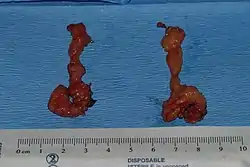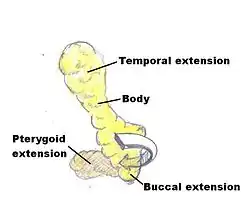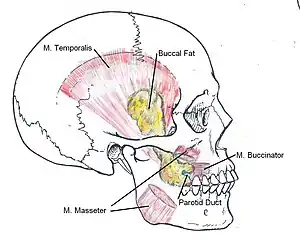| Buccal fat pad | |
|---|---|
 Extracted buccal fat | |
 Buccal fat pad diagram | |
| Details | |
| Identifiers | |
| Latin | corpus adiposum buccae |
| TA98 | A05.1.01.015 |
| TA2 | 2141 |
| FMA | 59799 |
| Anatomical terminology | |
The buccal fat pad (also called Bichat’s fat pad, after Xavier Bichat, and the buccal pad of fat) is one of several encapsulated fat masses in the cheek. It is a deep fat pad located on either side of the face between the buccinator muscle and several more superficial muscles (including the masseter, the zygomaticus major, and the zygomaticus minor).[1] The inferior portion of the buccal fat pad is contained within the buccal space. It should not be confused with the malar fat pad, which is directly below the skin of the cheek.[2] It should also not be confused with jowl fat pads. It is implicated in the formation of hollow cheeks and the nasolabial fold, but not in the formation of jowls.[3]
Nomenclature and structure
The buccal fat pad is composed of several parts, although exactly how many parts seems to be a point of disagreement and no single consistent nomenclature of these parts has been observed. It was described as being divided into three lobes, the anterior, intermediate, and posterior, “according to the structure of the lobar envelopes, the formation of ligaments, and the source of the nutritional vessels”.[1] Also, there are four extensions from the body of the buccal fat pad: the sublevator, the melolabial, the buccal, and the pterygoid. The nomenclature of these extensions derives from their location and proximal muscles.[4]
The anterior lobe of the buccal fat surrounds the parotid duct, which conveys saliva from the parotid gland to the mouth. It is a triangular mass with one vertex at the buccinators, one at the levator labii superioris alaeque nasi, and one at the orbicularis oris. The intermediate lobe lies between the anterior and posterior lobes over the maxilla.[1][4] The intermediate lobe seems to lose a significant amount of volume between childhood and adulthood. The posterior lobe of the buccal fat pad runs from the infraorbital fissure and temporal muscle to the upper rim of the mandible and back to the mandibular ramus.

Function
Some people describe the buccal fat pad’s primary function in relation to chewing and suckling, especially in infants. This theory derives some support from the loss of volume to the intermediate lobe, which would be most directly involved in chewing and sucking, from infancy to adulthood.
Another proposed function is as gliding pads that facilitate the action of the muscles of mastication.[1]
The buccal fat pad may also function as a cushion to protect sensitive facial muscles from injury due to muscle action or exterior force.[1]

Clinical uses
The buccal fat pad is commonly used in facial recontouring. Several authors discuss the importance of the buccal fat pad in attaining good results from a facelift.[2][5][6][7]
Buccal flaps (not always including the buccal fat pad) are used in reconstruction of the periorbital area after injury.[8] They are also used to repair congenital defects of the oral cavity[9][10] or for repair of congenital cleft palate.[11]
Removal of the buccal fat pad is also sometimes used to reduce cheek prominence, although this procedure may carry with it a significant risk of damage to the buccal branch of the facial nerve and the parotid ducts.[12]
References
- 1 2 3 4 5 Zhang; Yan, YP; Qi, KM; Wang, JQ; Liu, ZF (2002). "Anatomical structure of the buccal fat pad and its clinical adaptations". Plastic and Reconstructive Surgery. 109 (7): 2509–18, discussion 2519–20. doi:10.1097/00006534-200206000-00052. PMID 12045584.
- 1 2 Rohrich; Pessa, JE (2007). "The fat compartments of the face: anatomy and clinical implications for cosmetic surgery". Plastic and Reconstructive Surgery. 119 (7): 2219–27, discussion 2228–31. doi:10.1097/01.prs.0000265403.66886.54. PMID 17519724. S2CID 11443581.
- ↑ Reece; Pessa, JE; Rohrich, RJ (2008). "The mandibular septum: anatomical observations of the jowls in aging-implications for facial rejuvenation". Plastic and Reconstructive Surgery. 121 (4): 1414–20. doi:10.1097/01.prs.0000302462.61624.26. PMID 18349664. S2CID 30007446.
- 1 2 Gassner; Rafii, A; Young, A; Murakami, C; Moe, KS; Larrabee Jr, WF (2008). "Surgical anatomy of the face: implications for modern face-lift techniques". Archives of Facial Plastic Surgery. 10 (1): 9–19. doi:10.1001/archfacial.2007.16. PMID 18209117.
- ↑ Rohrich; Ghavami, A; Lemmon, JA; Brown, SA (2009). "The individualized component face lift: developing a systematic approach to facial rejuvenation". Plastic and Reconstructive Surgery. 123 (3): 1050–63. doi:10.1097/PRS.0b013e31819c91b0. PMID 19319074. S2CID 7960691.
- ↑ Lambros; Stuzin, JM (2008). "The cross-cheek depression: surgical cause and effect in the development of the "joker line" and its treatment". Plastic and Reconstructive Surgery. 122 (5): 1543–52. doi:10.1097/PRS.0b013e31818894d3. PMID 18971739.
- ↑ Tapia; Ruiz-De-Erenchun, R; Rengifo, M (2006). "Combined approach for facial contour restoration: treatment of malar and cheek areas during rhytidectomy". Plastic and Reconstructive Surgery. 118 (2): 491–7, discussion 498–501. doi:10.1097/01.prs.0000235265.26138.66. PMID 16874222. S2CID 34619538.
- ↑ Holton Lh; Rodriguez, ED; Silverman, RP; Singh, N; Tufaro, AP; Grant, MP (2004). "The buccal fat pad flap for periorbital reconstruction: a cadaver dissection and report of two cases". Plastic and Reconstructive Surgery. 114 (6): 1529–33. doi:10.1097/01.prs.0000138257.44949.bb. PMID 15509944.
- ↑ Egyedi (1977). "Utilization of the buccal fat pad for closure of oro-antral and/or oro-nasal communications". Journal of Maxillofacial Surgery. 5 (4): 241–4. doi:10.1016/S0301-0503(77)80117-3. PMID 338848.
- ↑ Landes; Seitz, O; Ballon, A; Stübinger, S; Robert, S; Kovács, AF (2009). "Six years clinical experience with the dorsally pedicled buccal musculomucosal flap". Annals of Plastic Surgery. 62 (6): 645–52. doi:10.1097/SAP.0b013e318180cd3e. PMID 19461278. S2CID 19589645.
- ↑ Levi; Kasten, SJ; Buchman, SR (2009). "Utilization of the buccal fat pad flap for congenital cleft palate repair". Plastic and Reconstructive Surgery. 123 (3): 1018–21. doi:10.1097/PRS.0b013e318199f80f. PMID 19319069. S2CID 46125308.
- ↑ Hwang; Cho, HJ; Battuvshin, D; Chung, IH; Hwang, SH (2005). "Interrelated buccal fat pad with facial buccal branches and parotid duct". The Journal of Craniofacial Surgery. 16 (4): 658–60. doi:10.1097/01.SCS.0000157019.35407.55. PMID 16077311. S2CID 23030715.